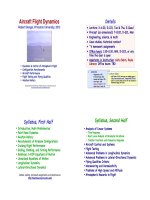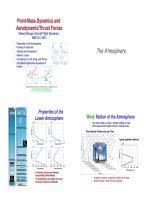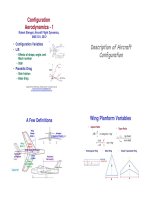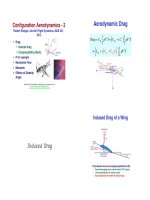Aircraft Flight Dynamics Robert F. Stengel Lecture3 Aviation History Mythology to 1990
Bạn đang xem bản rút gọn của tài liệu. Xem và tải ngay bản đầy đủ của tài liệu tại đây (2.08 MB, 17 trang )
• Greek mythology: Daedalus and Icarus!
– Attempt to escape from Crete!
• 863 BC: Bladud (King Lears father)!
– 9
th
king of England !
– First tower-jumper!
– Wings of feathers!
– Died of a broken neck!
Aviation History:
Mythology to 1990
Robert Stengel, Aircraft Flight Dynamics, MAE 331, 2012"
Copyright 2012 by Robert Stengel. All rights reserved. For educational use only.!
/>!
/>!
Antiquity
Experimentalists"
• Henri Pitot: Pitot tube (1732)!
• Benjamin Robins: Whirling
arm "wind tunnel (1742)!
• Sketches "modern" airplane
configuration (1799)!
• Hand-launched glider (1804)!
• Papers on applied
aerodynamics (1809-1810)!
• Triplane glider carrying 10-yr-
old boy (1849)!
• Monoplane glider carrying
coachman (1853)!
– Cayley's coachman had a steering
oar with cruciform blades!
• Modern reconstruction (right)!
Sir George Cayley!
Visionaries and Theorists!
• 1831: Thomas Walker!
– Various glider concepts!
– Tandem-wing design influenced Langley!
• 1843: William Henson & John Stringfellow !
– Aerial steam carriage concept!
– Vision of commercial air transportation (with
Marriott and Columbine, The Aerial Transit
Company)!
• 1860-1900: Theoretical aerodynamic
contributions!
– Helmholtz!
– Kirchhoff!
– Lord Rayleigh!
– Reynolds!
– Lanchester, and others
!
19
th
Century Flyers"
• 1868: Jean Marie Le Bris!
– Artificial Albatross glides a short distance!
• 1891-96: Hang-glider flights!
– Otto Lilienthal!
– Chanute, Pilcher, !
• 1890: Clement Ader!
– Steam-powered Eole hops!
• 1894: Sir Hiram Maxim!
– Steam-powered biplane hops!
– Vertical gyro/servo control of the
elevator!
• 1884: Alexander Mozhaisky's
steam-powered manned airplane!
– brief hop off the ground!
– flat-plate wings
!
• 1874: Felix du Temple's hot-air engine
manned monoplane!
– Flies down a ramp!
Early 20th Century
Samuel Pierpoint Langley"
• Astronomer supported by Smithsonian Institution!
• Whirling-arm experiments!
• 1896: Langley's steam-powered Aerodrome model
flies 3/4 mile!
• 1903: Manned aircraft flight ends in failure!
The Wright Brothers"
• Wilbur and Orville were bicycle mechanics
from Dayton, OH!
• Self-taught, empirical approach to flight!
• Wind-tunnel, kite, and glider experiments
!
• 1903: Powered, manned aircraft
flight ends in success
!
Wright Brothers
Technical Contributions"
• Recognized importance of
balance and steering!
– Bank to turn preferable to
skid turn!
– Roll control induced yaw!
– Too much stability!
• hinders control!
• increases response to gusts!
– Wings can stall!
• Experimental gliders!
– Wing warp controlled roll!
– Foreplanes controlled pitch!
• 2
nd
glider!
– Vertical tail !
– Coupled to the wing warp
to
suppress adverse yaw
!
After Kitty Hawk!
• 1906: 2
nd
successful aviator: Alberto
Santos-Dumont, standing!!
– High dihedral, forward control surface!
• Wrights secretive about results until
1908; few further technical contributions
!
• 1908: Glenn Curtiss et al incorporate
ailerons!
– Wright brothers sue for infringement
of 1906 US patent (and win)
!
• 1909: Louis Bleriot's flight
across the English Channel
!
Glenn Curtiss"
• 1908: Glenn Curtiss becomes dominant US aviation inventor!
• 1914: Langleys Aerodrome finally flies!
– Curtiss et al modify and fly Langley Aerodrome!
– Unsuccessful effort to discredit Wright patent!
– Alexander Graham Bells support!
Stability vs. Control
OR
Stability and
Control?!
• Prior to 1903, it was thought that an airplane
should hold its course alone!
– Pilot could steer by deflecting the rudder !
• This suggested:!
– Aft-mounted tail!
– Wing dihedral or high wing!
– Proper center-of-mass location!
Early Aircraft Control"
• Lillienthal shifted center of mass in
hang gliders!
• Langley's plane had movable
cruciform tail!
• Wright brothers used wing warping
and movable rudder and elevator
surfaces!
• Glenn Curtiss invented aileron
surfaces!
Pilot Inputs to Control:
the Wright Approach"
• 1903 Wright Flyer!
– Prone pilot !
– Stick for pitch control!
– Hip cradle for wing-warping roll
control!
– Aileron-rudder interconnect (ARI)!
– http://
www.airspacemag.com/how-
things-work/1903-flyer.html!
• 1905 Wright Flyer !
– Upright pilot !
– Left lever for pitch!
– Right lever for roll and yaw with ARI!
– Right lever later modified to separate
roll (left-right) and yaw (fore-aft)
control) w/o ARI!
– Feet not used for control!
– http://
wright.nasa.gov/airplane/
air1905.html!
Control Linkages:
the Bleriot Approach"
• Louis Bleriot introduced:!
– Rudder bar controlled by feet!
– Center stick for pitch and roll control
!
Bleriot XI!
/> />Aviation in The Great War"
• 1914-18: World War I changes the
complexion of flying!
– Reconnaissance!
– Air superiority (dog fights) !
– Bombing!
– Personal transport!
• Wrights US monopoly broken by
licensing for war effort!
• Aircraft Design!
– Biplanes, a few mono- and
triplanes!
– Design for practical functions!
– Multiple engines, larger aircraft!
– Aft tails!
– Increased maneuverability,
speed, g-loads, altitude!
– Improved piston engines!
– Tractor propellers!
SPAD S.VII!
World War I fighter replicas in flight!
http://
www.youtube.com/watch?v=JsT_rgScrg0!
Maneuvering World War I Aircraft"
• Maneuverable aircraft with
idiosyncrasies!
– Rotary engine!
– Small tail surfaces!
– Reliability issues!
• Maneuvering to stalls and spins!
• Snap roll: rudder and elevator!
• Barrel roll : aileron !
• Cross-control (e.g., right rudder, left
stick)!
– glide path control during landing !
– good view of landing point!
• Unintended snap rolls led to spins and
accidents during takeoff or landing!
/> />Sopwith Camel"
• Rotary engine induced gyroscopic coupling!
• Highly maneuverable!
• Aft fuel tank; when full, center of mass was too far aft
for stability!
• Vertical tail too small, spin recovery not automatic
with centering of controls!
/>S.E 5 vs. Fokker D.VII"
• RAF S.E 5: theoretical approach to design!
– Best WWI design from the Royal Aircraft
Factory!
– Stationary engine!
– High dihedral!
– Stable spiral mode!
– High control forces!
– Poor maneuverability!
– Relatively safe and effective!
• Fokker D.VII: empirical approach to
design!
– Horn balances to reduce control forces!
– Stationary engine!
– Neutral-to-negative stability!
– Good maneuverability!
– Relatively dangerous!
The Correct Answer:
Stability AND Control"
• Need for better understanding of Flying (or
Handling) Qualities !
– Stability and controllability characteristics as perceived
by the pilot!
• Desired attributes: Stability of the S.E 5 and
controllability of the D.VII!
/>Between the Wars
Aviation Between the Wars"
• 1918-38: !
– Birth of airlines!
– Trophy races
/>v=R3AROX6OO88!
– Aviation firsts (Lindbergh crosses the
Atlantic, 1927)
/>v=uIUL_qUJUOo&feature=related!
– Flying boats !
– Sport aviation!
Curtiss R3C-2!
Gee-Bee R-1!
Ryan NYP!
/>Air Commerce Act of 1926"
• Airlines formed to carry mail and passengers: !
– Northwest (1926)!
– Eastern (1927), bankruptcy!
– Pan Am (1927), bankruptcy!
– Boeing Air Transport (1927), became United (1931)!
– Delta (1928), consolidated with Northwest, 2010!
– American (1930)!
– TWA (1930), acquired by American!
– Continental (1934), consolidated with United, 2010!
Boeing 40!
Ford Tri-Motor!
Lockheed Vega !
/>Commercial Aircraft of the 1930s!
• Streamlining, engine cowlings!
• Douglas DC-1, DC-2, DC-3!
• Lockheed 14 Super Electra,
Boeing 247, exterior and interior
!
Seaplanes Became the First
TransOceanic Air Transports
!
• PanAm led the way!
– 1
st
scheduled TransPacific flights(1935)!
– 1
st
scheduled TransAtlantic flights(1938)!
– 1
st
scheduled non-stop Trans-Atlantic flights (VS-44, 1939)!
• Boeing B-314, Vought-Sikorsky VS-44, Shorts Solent!
• Superseded by more efficient landplanes (lighter, less drag)!
/>1930s Air Racers Presage
Fighters of World War II"
• Aircraft Design !
– Transition to
monoplanes!
– Metal skins and
structure!
– Semi-monocoque design!
– Improved aerodynamics!
– Improved in-line, V, and
radial engines !
– Increased
maneuverability, speed,
altitude!
– Seaplanes faster than
landplanes (why?)
!
Supermarine S.6B!
Hughes H-1 (replica)!
Macchi MC72!
V = 566 km/hr!
V = 709 km/hr!
V = 547 km/hr!
World War II
/>Technology of World War II Aviation"
• 1938-45: Analytical and experimental
approach to design!
– Many configurations designed and
flight-tested !
– Increased specialization; radar,
navigation, and communication!
– Approaching the "sonic barrier!
• Aircraft Design! !
– Large, powerful, high-flying aircraft!
– Turbocharged engines!
– Oxygen and Pressurization
!
Spitfire!
P-51D!
B-17!
/>Power Effects on Stability and Control!
• Gee Bee R1 Racer: an engine with
wings and almost no tail"
• During W.W.II, the size of fighters
remained about the same, but
installed horsepower doubled (F4F
vs. F8F)!
• Use of flaps means high power at
low speed, increasing relative
significance of thrust effects"
• Short-Takeoff-and-Landing (STOL)
aircraft augment takeoff/landing lift in
many ways, e.g.,"
– Full-span flaps"
– Deflected thrust"
Grumman F8F!
Grumman F4F!
GB R1!
C
T
o
,C
T
V
,C
T
δ
T
,C
L
δ
T
World War II Carrier-
Based Airplanes!
• Takeoff without catapult, relatively
low landing speed
/>v=4dySbhK1vNk!
• Tailhook and arresting gear!
• Carrier steams into wind!
• Design for storage (short tail length,
folding wings) affects stability and
control!
Chance-Vought F4U Corsair!
Grumman TBF!
Douglas TBD!
F4U flight"
/>!
SBD Dauntless Flight"
/>!
F4U!
Carrier Crash Landings!
/>!
Grumman TBF !
Multi-Engine Aircraft of World War II!
• Large W.W.II aircraft had
unpowered controls:!
– High foot-pedal force!
– Rudder stability problems
arising from balancing to
reduce pedal force!
• Severe engine-out problem
for twin-engine aircraft!
Boeing B-17!
Boeing B-29!Consolidated B-24!
Douglas A-26!
North American B-25!
Martin B-26!
WW II Military Flying Boats!
• Seaplanes proved useful during World War II!
Lockheed PBY Catalina!
Martin PBM Mariner !
Martin PB2M Mars!
Boeing XPBB Sea Ranger!
Saunders-Roe SR.36 Lerwick!
Grumman JRF-1 Goose!
Birth of the Jet Airplane"
Bell P-59A (1942)!
Gloster Meteor (1943)!
Messerschitt Me 262 (1942)!
Heinkel He. 178 (1939)!
Gloster E/28/39 (1941)!
Early Jet Aircraft
From Propellers to Jets!
Douglas XB-43!
Douglas XB-42 Mixmaster!
Convair B-36!
Convair YB-60!
Northrop YB-35! Northrop XB-49!
Jets at an Awkward Age!
• Performance of the first jet aircraft
outstripped stability and control
technology!
– Lacked satisfactory actuators,
sensors, and control electronics!
– Transistor: 1947, integrated circuit:
1958!
• Dramatic dynamic variations over
larger flight envelope!
– Control mechanisms designed to
lighten pilot loads were subject to
instability!
• Reluctance of designers to
embrace change, fearing decreased
reliability, increased cost, and
higher weight !
North American B-45!
Lockheed P-80!
Douglas F3D!
Convair XF-81!
From Straight to Swept Wings!
• Straight-wing models were redesigned with swept wings to
reduce compressibility effects on drag!
• Dramatic change in stability, control, and flying qualities!
• North American FJ-1
and FJ-4 Fury!
• Republic F-84B Thunderbird
and F-84F Thunderstreak!
• Grumman F9F-2 Panther
and F9F-6 Cougar!
Toward Supersonic
Flight and Stealth
Fighter Jets of the 1950s!
• Emphasis on supersonic speed!
Republic F-105!
Lockheed F-104!
Convair F-102!
McDonnell F-101!North American F-100!
Fighter Jets of the 1960s!
• Emphasis on mission!
McDonnell F-4!
Dassault Mirage F1!
Convair F-106!
Grumman A-6!
Fighter Jets of the 1980s!
• Emphasis on performance!
Repbulic F-105!
Lockheed-Martin F-117!
Panavia Tornado!
BAE/McDonnell-Douglas AV-8B!
Mig-31A!
Personal and
Business Aircraft
Early Concepts for Safe
Personal Aircraft
!
• Low takeoff and landing speeds!
• Benign flying qualities!
• Stall/spin-proof designs!
• Ercoupe!
– Limited control authority!
– Control wheel, ARI, no rudder pedals!
– Limited center-of-mass travel!
– Limited speed range!
– Wing leveling and lateral stability!
– Fixed, tricycle landing gear!
Curtiss Tanager!
Piper J-3 Cub!
Ercoupe!
Less-Safe Personal Airplanes!
• Mignet Flying Flea (Homebuilt, pivoting main wing, no ailerons, unrecoverable dive)!
• V-tail Beechcraft Bonanza Model 35 (10,000 built, 250 in-flight structural failures) !
• American Yankee AA-1 (BD-1, hot, stalls and spins) !
• Bede BD-5 (Home-built, unforgiving flying qualities)!
Propeller-Driven Personal Aircraft!
• Single reciprocating engine, mechanical controls, fixed or
retracting gear, high price!
• Cirrus SR-20/22 has a recovery parachute
(used 13 times
through 2008, saved 24 lives; 2 parachute failures)!
Piper Malibu!
Cessna 172!
Cirrus SR20/22!
Beech Bonanza A36!
Mooney M20!
Business Jets!
• Twin turbojet/fan engines!
Gulfstream II!
Cessna Citation I!
Learjet 24!
North American Sabreliner!
Commercial
Transport Aircraft
Commercial Aircraft of the 1940s!
• Pre-WWII designs!
• Derivatives of military transport and
bomber aircraft of WWII!
– Convair 240 (> C-131, T-29)!
– Douglas DC-4 (> C-54)!
– Boeing Stratoliner 377 (from B-29, C-97)!
– Lockheed Constellation 749 (from C-69)!
Commercial Propeller-Driven Aircraft of the 1950s!
• Introduction of the turboprop engine!
• Douglas DC-6, DC-7, Lockheed Starliner 1649, Vickers Viscount, Bristol
Britannia, Lockheed Electra 188!
Commercial Jets of the 1950s!
• Low-bypass ratio turbojet
engines!
• deHavilland Comet (1954)!
– 1
st
commercial jet transport!
– engines buried in wings!
• Boeing 707 (1957)!
– derived from USAF KC-135!
– engines on pylons below wings!
– largest aircraft of its time!
• Sud-Aviation Caravelle (1959)!
– 1
st
aircraft with twin aft-
mounted engines!
Small Commercial Jets of the 1960s!
• Preponderance of aft-mounted 2-
and 3-engine configurations (BAC
1-11, Douglas DC-9)!
• Boeing 727 (1963)!
– 1
st
with 3 aft-mounted engines!
• Hawker-Siddeley Trident (1964)!
• Boeing 737 (1967)!
Large Commercial Jets of the 1960s!
• Pylon-mounted 4-engine configurations
(Convair 880, DC-8, Stretched DC-8, Boeing 747)!
• DC-8 design was well-suited to a stretch
(fuselage plugs fore and aft of wing!
• B-707 was not!
Commercial Jets of the 1970s!
• High-bypass turbofan engines!
• Introduction of the 2/3-engine
jumbo jets!
– Lockheed L-1011!
– Douglas DC-10!
– Airbus A300!
• Supersonic transports!
– BAC/SA Concorde (1972)!
– Tupolev Tu-144 (1977)!
Lockheed L-1011!
Douglas DC-10!
Airbus A300!
BAC/SA Concorde!
Tupolev Tu-144!
Commercial Jets of the 1990s!
• Derivatives of 1980s designs
(McDonnell-Douglas MD-11, Boeing
747-400, Airbus A330)!
• First Boeing fly-by-wire design (B-777)!
• First 4-engine Airbus (A340)!
McDonnell-Douglas MD-11!
Boeing 747-400!
Airbus A330!
Boeing 777!
Boeing 247!
Airbus A340!
Daedalus and Icarus Revisited,
23 April 1988
•
Human-powered airplane, MIT Daedalus, flies 115 km
from Crete to the mainland (Santorini) in 3 hr, 54 min
•
Empty mass = 31 kg
/> />Next Time:
Configuration Aerodynamics
Reading
Flight Dynamics, 65-84!
Virtual Textbook, Part 4,5
Supplemental
Material
Natural Philosophers and Theorists"
• 350 BC: Aristotle!
– Continuum model!
– Suggests that a body
moving through continuum
would encounter resistance !
• 250 BC: Archimedes!
– Fluid set in motion by
pressure differential
!
• 1490: Da Vinci ! !
– Cross-sectional area times
Velocity = constant
(continuity)!
– Sketches of flow patterns!
– Ornithopter and helicopter
concepts
!
• 1669-87: Newton!
– Newton's Laws!
– Newtonian flow, sin
2
!
force dependency!
• 1738: Bernoulli!
– Pressure-velocity
relationship!
• 1752: Euler !
– Equations for fluid flow!
• 1788: Lagrange!
– Velocity potential and
stream function!
The Early Wright Flyers"
• 1903 Wright Flyer was
very unstable, almost
unmanageable !
• In 1904-5:!
– Removed wing anhedral
(negative dihedral)!
– Increased rudder and
elevator area!
– Rudder controlled by
separate lever!
– Center of mass moved
forward
!
Those Magnificent Men in
Their Flying Machines"
• Aircraft Design!
– Biplanes and monoplanes !
– Thin, cambered wings!
– Fore and aft horizontal tails!
– Aft vertical tails
!
– Wooden frames and struts,
wire bracing, canvas covering!
– Gasoline engines, improved
efficiency!
– Invention of rotary engine
!
Stability and Control Analysts"
• Frederick Lanchester (1868-1946) !
– Model gliders!
– Two books, Aerial Flight and
Aerodynetics, 1907!
– Identified the phugoid mode!
– Mechanical engineer, built
innovative motor cars!
– Operations research!
• Lanchester
s Power Laws!
• George H. Bryan (1864-1928)!
– Longitudinal equations of motion
(with W.E. Williams, 1903)!
– Full equations of motion and
linearized equations (1911)
!
Comfort and Elegance by the End of the Decade!
• Boeing 307, 1st pressurized cabin (1936), flight engineer, B-17 pre-cursor, large
dorsal fin (exterior and interior)!
• Sleeping bunks on transcontinental planes (e.g., DC-3)!
• Full-size dining rooms on flying boats!
Early Carrier Jets!
• Problems exacerbated for jet
aircraft!
– slower thrust response!
– higher approach speeds!
– reduced phugoid damping!
– lower lift-slope wings!
– higher angles for trim!
McDonnell FH-1 Banshee!
McDonnell F3H-1 Demon !
North American FJ-2 Fury!
Vought F7U Cutlass!
Grumman F9F Panther !
Jet-Powered Sea Planes!
• Primarily experimental aircraft!
• Overtaken by events!
Convair XF2Y Sea Dart !
Saunders-Roe SR.A/1!
Beriev Be-200!
Martin XP6M Seamaster!
• but perhaps the Be-200 (2004) may
change that!
Fighter Jets of the 1970s!
• Emphasis on agility and attack!
Northrop F-5E!
Grumman F-14!
McDonnell-Douglas F/A-18!
General Dynamics F-16!
Republic A-10!
McDonnell-Douglas F-15!
Commercial Jets of the 1980s!
• Extensions of the 1970s transports (Boeing
757, 767, Airbus A310, A320)!
• Introduction of fly-by-wire control, side-stick
hand controllers, glass cockpit (A320)!
• Cockpit commonality!
Boeing 757!
Boeing 767!
Airbus A310!
Airbus A320!
Development of Commercial Jets Over
52 Years!
Boeing 707-120B Airbus A340-300 Boeing 787-3
Date of Service Entry 1958 1991 2011
Cockpit crew 3 2 2
Passengers 110 (2 class) 335 (2-class, typical) 290-330
Length 145 ft 1 in (44.07 m) 63.60!metres (208!ft!8!in) 186!ft (56.7 m)
Wingspan 145 ft 9 in (44.42 m) 60.30!metres (197!ft!10!in) 170!ft!6!in (52.0 m)
Wing Sweep Angle 37.5 deg 30 deg 32.2 deg
Wing Area
3,010 square feet (280 m
2
)
361.6!square metres (3,892
sq!ft)
3,501!sq!ft (325 m
2
)
Tail height 42 ft 5 in (12.93 m) 16.85!metres (55!ft!3!in) 55!ft!6!in (16.9 m)
Fuselage width 12!ft 4 in (3.76 m) 5.64!metres (18!ft!6!in) 18!ft!11!in (5.77 m)
Maximum Takeoff Weight
(MTOW)
257,000 lb (116,570 kg)
276,500!kilograms (610,000
lb)
375,000!lb (170,000
kg)
Empty weight 122,533 lb (55,580 kg)
130,200!kilograms (287,000
lb)
223,000!lb (101,000
kg)
Runway needed at MTOW 11,000 ft (3,330 m) 2,990!metres (9,810 ft) TBD
Fuel Capacity 17,330 US gal (65,590 l)
147,850!litres (39,060!US
gal)
12,830!US!gal
(48,567 L)
Range at MTOW (max fuel) 4,700 nmi (8,704 km)
7,400!nautical miles
(13,700 km; 8,500 mi)
2,500–3,050 nmi
(4,630–5,650 km;
2,880–3,510 mi)
Cruising speed Mach 0.82 Mach 0.82 Mach 0.85
Powerplants 17,000!lbf (75.6!kN) x 4
139–151 kilonewtons
(31,000–34,000 lb
f
) x 4
53,000!lbf (240!kN) x
2
Aerobatics"
• Flat Spins Upright Spins and Snap Roll Spins!
/> />• Barrel Roll, Aileron Roll, Loop, Hammerhead!
/>• Bob Hoover in his Aero Commander Shrike!
/>• Bob Hoover in his F-86 Sabre!
/>• Learjet!









